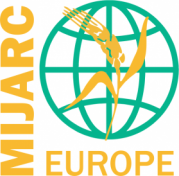Author: Florina Potirniche
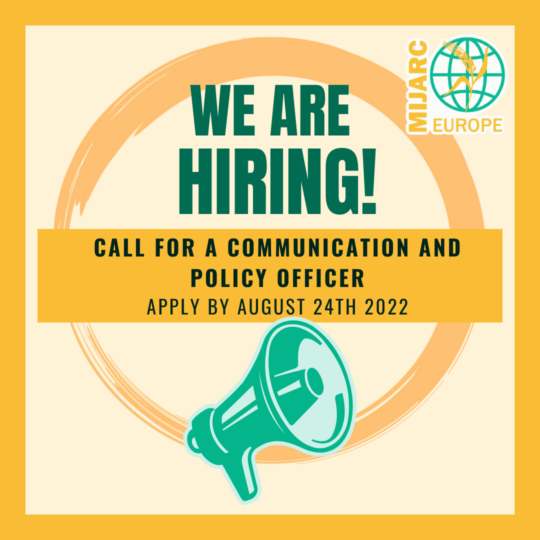
Call for a Communication and Policy Officer
MIJARC Europe is a non-governmental organisation for rural youth, by rural youth. We promote sustainable agricultural, rural and international development, European citizenship, youth policies, gender equality, environmental protection, interculturality and human rights. In line with our Christian values, we strive to implement and raise awareness about these issues and goals by facilitating inter-cultural non-formal learning opportunities and engaging in advocacy and partnership processes. Employing our methodology of ‘see-judge-act’, we encourage the participation of young people to build the Europe of tomorrow.
We are seeking to hire a resourceful person with strong communication and advocacy skills as well as a good understanding of the EU youth policy environment to fulfil the tasks of a Communication and Policy Officer. This is a critical role primarily accountable for a strong engagement with our member organisations, our political work and the visibility of MIJARC Europe. To be successful in this role you should be passionate about working for non-profit organisations, understanding their specificities and possess a flexible and proactive approach to work.
1. Job duration and conditions
Role: Communication and Policy Officer
Reports to: Report to the secretariat management team
Duration: One year contract (CDD) approximately from September 2022 to August 2023. There is a possibility for the contract to be extended.
Location: Office in Brussels (Rue de l’Industrie 10) with the possibility of occasional travels in Europe. This is not a remote position but there is the possibility of partially working remotely.
Working time: Full-time (38 hours per week).
Renumeration: 2300 EUR gross per month
Benefits: 7-euro lunch vouchers on full-working days.
2. Responsibilities
COMMUNICATION (70%)
- Coordinate the creation of MIJARC’s annual Communication Action Plan in line with our Communication Strategy;
- Ensure the communication (before-during-after) regarding MIJARC’s Europe events and activities;
- Manage our social media channels and ensure regular posting, supported by our volunteer Communication Commission;
- Develop European-wide communication campaigns in cooperation with our member organisations;
- Monitor communication campaigns from partners in order to identify possible collaborations;
- Support the volunteers in the Communication Commission, providing assistance and training and ensuring their well-being;
- Manage our website mijarc.eu and engage in its development, creating contents and visuals.
ADVOCACY (30%)
- Coordinate the implementation of our Advocacy Strategy;
- Support the work of the volunteers in the Advocacy Commission, providing assistance and training and ensuring their well-being;
- Monitor some key policy developments and networks (Farm to Fork, HREDD, ERDN, CoE, EU Youth Strategy);
- Represent us in one of our umbrella organisation: the European Coordination la Via Campesina (ECVC);
- Represent us in meetings with European Institutions or partners.
OTHER RESPONSABILITIES
- Undertake any other related responsibilities commensurate with the evolving objectives of the post and the evolution of the organization, as may reasonably be requested by the Secretariat Management Team or the Executive Board.
3. Profile
- A relevant degree in Communication, Politics or International Relations;
- Experience with strategic planning of communication activities
- Experience with designing social media campaigns and managing a WordPress-based website;
- Experience in policy monitoring, especially with regards to agriculture, environmental or rural policies;
- Experience in representation and networking at international conferences and events;
- Very good knowledge of Office tools (Word, Excel, etc.);
- Comfortable working with different IT and web management tools, and willingness to learn more tools;
- Be a Team player, creative, proactive, and autonomous
Highly valued
- Graphic design skills and/or Website design and management (WordPress);
- A rural background;
- An interest in agricultural issues and knowledge of peasant farming and agroecology would be an asset;
- Previous experience with volunteers of different nationalities;
- Knowledge of Dutch or French;
Other
- All applicants must have the right to live and work in Belgium
4. Application procedure
To apply, send us a motivation letter (max 1 page) and your CV (max 2 pages) in a PDF file to recruitment@mijarc.eu with the subject line “Application Communication and Policy Officer_Name”.
We will review applications on a rolling basis and the last date for applications will be Wednesday 24th August 2022 at 23:59 CET
Selected candidates will be invited for a second selection phase as an online or offline interview.
The successful candidate will start at the earliest convenient date but no later than the 18th September 2022. We reserve to close the call earlier if we find the right person for the position.
SCHOOL OF INFLUENCERS – PARIS, June 2022
By Francesco Bottegal
Introduction
Advocating and campaigning for a fairer and more sustainable food supply chain in Europe and beyond: this is the essence of the OUR FOOD OUR FUTURE project.
In a society where technological progress has deeply changed the way we interact and communicate with one another, how can we use digital tools for campaigning, raising awareness and mobilising the public? What is the role of social media in advocacy, as they represent a space where information spreads instantly and on which everyone can have a say on any topic? Can we still fight effectively for what we believe in? How can we make our voices stand out in an ocean of opinions?
These are only a few questions we tackled during our last School of Influencers (SOI) activity that took place in Paris. After a first session held online at the beginning of May, we organized a presential event in Paris which lasted two days from 18th to 19th of June 2022, and turned out to be such an enriching and inspiring IN PERSON experience, as we were welcomed by our French member organisation, MRJC, in their office.
Together with 20 aspiring campaigners from all over Europe, we learnt and discussed about the EU “Farm to Fork” Strategy (or F2F) and we learnt what its current state of affairs is. After clarifying many thematic aspects of the policy at hand, the participants moved on by improving their understanding of social media campaigning, the opportunities associated with these digital spaces, with the help of our amazing trainers.
WHAT DID WE SAY ABOUT THE F2F STRATEGY?
Drawing from the conclusions attained during the online session of our School of Influencers held in May, we focused our attention on the current debate happening both within and outside the EU institutions. At the time of writing, the main item on this European agenda, that impacts us all, is the discussion on the use of synthetic pesticides in agriculture and the introduction of legally binding reduction targets.
In such a critical moment for the European transition to sustainable food system, agribusiness lobbies and a number of national governments have instrumentally used the war in Ukraine to postpone and undermine EU environmental commitments. Furthermore, this ‘hostile’ front, consisting of several actors, is engaged in fierce lobbying activity sharing partial studies (some funded by the industry itself) and deliberately spreading misleading information against the “Farm to Fork” Strategy.
UPDATE
On 22nd of June 2022, the European Commission proposed a set of new rules, to be included in a Regulation, hence in a legislative tool directly binding for all the Member States, to reduce the use and risk of pesticides in the EU, delivering on the Farm to Fork Strategy.
The main points regard the introduction of legally binding targets to reduce by 50% the use and risk of chemical pesticides by 2030; a ban on the use of all pesticides in sensitive areas and an exceptional EU support for farmers through the Common Agricultural Policy (CAP).
WHAT DID WE SAY ABOUT Campaigning on social media?
The other focal point of our weekend revolved around the notion of campaigning and how our understanding of it has changed due to technological and digital progress.
Social media have revolutionised the way we interact with one another, and how we receive and elaborate information, allowing to each of us to share our opinions and messages with thousandth, millions of people with just one click (by a single click?). The potential reach that these digital spaces offer to their users is one of the most interesting features when it comes to talking about social media as valuable means in awareness-raising and advocating.
Led by our experts, we reviewed and took inspiration from some successful campaigning efforts, such as the Patagonia Sin Ripresas and the Perwez campaigns, aiming at improving our comprehension of social media campaign dynamics. Thanks to this exercise, we appreciated how the social media landscape has provided campaigners, lobbyists and activists with a plethora of platforms that can be key in the effort to raise awareness and advocate. Looking at each platform with its features, we learned what to think of when we start devising our own campaign. We began with the difference between strategy and tactics, to continue with the elements that help us defining our target audience/s and accordingly choosing the most suitable platform to pursue our goals.
These learnings fed in our final activity, that indeed consisted of crafting and preparing a series of social media posts to raise awareness on the matter of the F2F strategy and, more broadly, on the subject of sustainability in the food supply chain, in Europe and beyond.
Conclusion
We are still enthusiastic about this session that brought together so many engaged and inspiring young people. We are going to share soon the outcomes produced by our participants. So, stay tuned and do not miss them and you’ll discover more on what MIJARC Europe and OURFOODOURFUTURE have in store for you!
This publication was produced with the financial support of the European Union. Its contents are the sole responsibility of MIJARC Europe and do not necessarily reflect the views of the European Union.
SOURCES
Agribusiness lobby against EU Farm to Fork strategy amplified by Ukraine war | Corporate Europe Observatory
Leak: industrial farm lobbies’ coordinated attack on Farm to Fork targets | Corporate Europe Observatory
Nature and human health cannot afford policy delays | Corporate Europe Observatory
Farm to Fork (europa.eu)
What it is about – Our Food Our Future (ourfood-ourfuture.eu)
Designing the campaign with young people
What is wrong with our current food system? Who is responsible for it? What are the many areas directly affected by its functioning? What can we do to change this? These are, among many others, the numerous questions that the actors of the #GoEAThical project are asking themselves and that we wish to answer together with the young people.
On the 28th of September, MIJARC Europe, in collaboration with other organisations of the #GoEAThical project consortium, organised an online session with young people from all across Europe, in order to reflect with them on the development of the campaign that will be launched. 48 participants attended this session.
The #GoEAThical project foresees the holding of different YouthLabs (at national and international levels) so that young people can take part in the development of the campaign and the project. However, the sanitary circumstances we are experiencing have significantly slowed down and then prevented the holding of these YouthLabs. In order to ensure that young people can still have their say, we thought of this session.
Learn how to design a campaign with our expert Julius
Julius van de Laar is a campaign and strategy consultant with many years of international campaign experience. During Barack Obama’s presidential campaign of 2007 and 2008, Julius was a full-time US presidential campaigner for him.
Julius is therefore our advisor in the implementation of the campaign for the #GoEAThical project. He was of course invited to this session, in order to briefly introduce the participants to the basics of running a campaign. Among the many keys he gave, Julius explained that a good campaign should be like a good story: to arouse emotions in people. Using this metaphor, he invited participants to reflect among themselves on what stirs up emotions of anger and indignation in them about the way the current food system works. He then proposed to them to name the actors of this system who could be considered as the villains of the story, being largely responsible for the inequalities denounced by the participants.
Highly invested and creative participants
“It was great meeting, I learnt a lot, and not only about campaign but also about how to do a very good online meeting and discussion. Thank you a lot!” Here is one of the feedback we received after we proposed to the participants to give us their views on the session using an online survey.
And indeed, the participants who were divided into 8 groups through breakout sessions, were particularly productive, not only in naming the injustices and actors involved in maintaining this unfair system, but also in proposing solutions and tactics to change it.
You can take a look below at their many proposals, which they managed to formulate in a very short space of time as the session lasted only two hours.
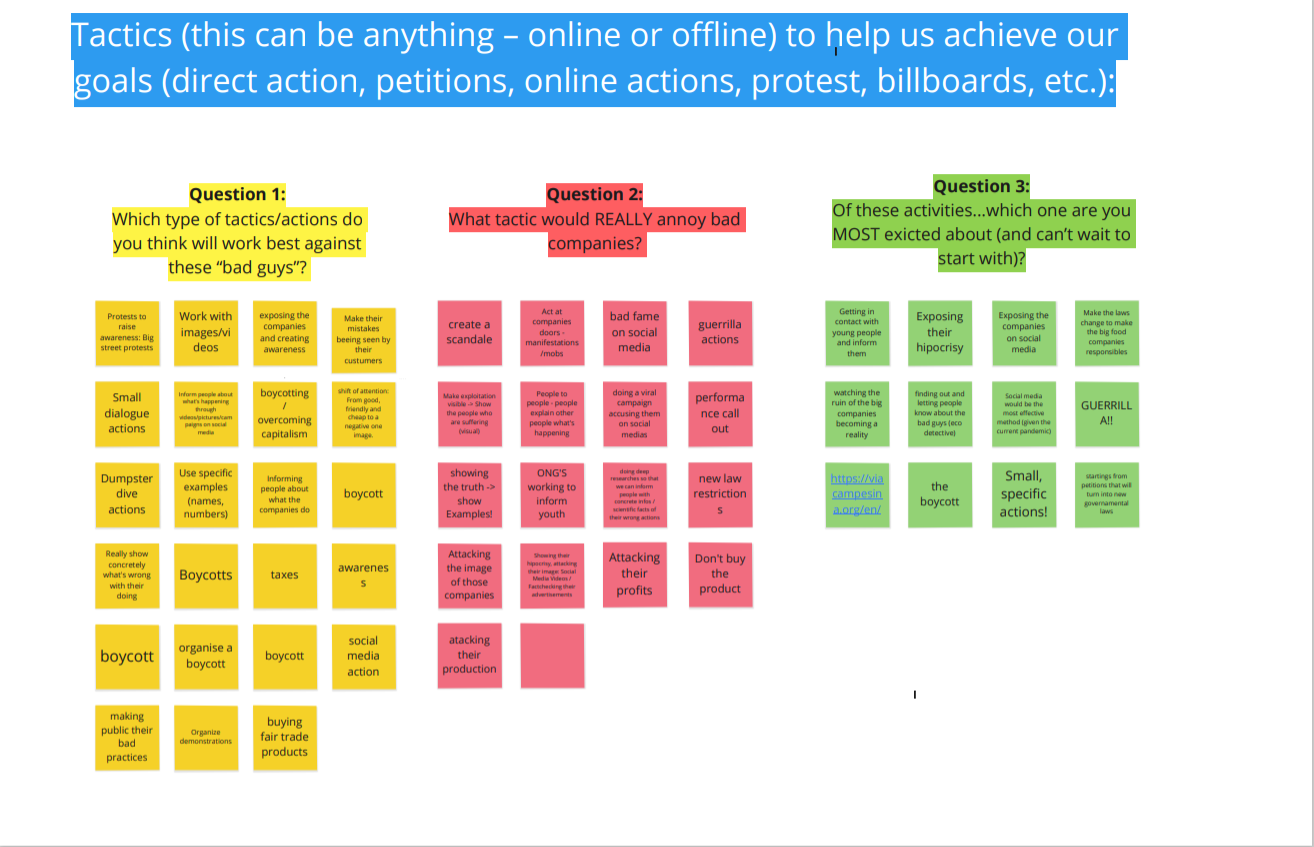
This session was of course only an outline, to reflect with young people on national, European and international issues concerning the food system and learning the basics of a large-scale campaign. But there will still be many steps in the design of the campaign and we look forward to continuing to work with young people, both those who attended this session and new ones, for further discussion and debate.
This publication has been produced with the financial assistance of the European Union. The contents of this document are the sole responsibility of MIJARC Europe and can under no circumstances be regarded as reflecting the position of the European Union.
Here we are, September has arrived. All over Europe children are going back to school, students are going back to university and adults are going back to work, even if for many of us it is teleworking.
Another thing ends at the same time as August, the sea and the vacations: our Grow It Yourself challenge. Together we planted our fruit and vegetables for 5 months. In order to celebrate this accomplishment, here is a little feedback from some of the participants and organizers:
“I am very proud of the three strawberries and one mini zucchini I had on my balcony this summer! I have to admit that it was all I managed to grew but they were awesome ![]() In general I am more thankful for the farmers who manage to feed some much people by working hard and in difficult conditions (work, weather etc.)”
In general I am more thankful for the farmers who manage to feed some much people by working hard and in difficult conditions (work, weather etc.)”
Claire.
“I was in charge of editing the photos for the duration of our campaign, what a pleasure it was to receive pictures of small seeds in April, and to see these same seeds become vegetables on the plates of the participants this summer. We really did something rewarding!“
Manon.
Grow it Yourself was by far the most satisfying challenge I took this year. It was a very rewarding feeling to be see my own vegetables growing. Productive, efficient and self motivating, Grow It yourself is indeed a challenge i would gladly take every year!
Sara.
This challenge has brought me closer to my roots and to my childhood. As a child I used to help my family in their farm and I spent most of my summer holidays outside, in the scorching sun, bare feet on the ground and eating whatever was ripe. I particularly remember watering the onion beds, because I could soak my feet in the ice-cold water that filled the onion beds and use my small hoe to direct the water wherever I wanted. I have not felt more in control than I felt then. I realised that there is a lot of land in my yard that we now use to grow green grass and we put considerable effort into having a manicured lawn, so I start ”taking back” the land and growing herbs, such as the ones I need on a daily basis. I realised that I was spending a lot of money on things that I could grow myself, and exclude the waste that comes together with buying herbs in plastic pots and without any of the chemicals that keep them looking fresh under the artificial light of the supermarkets. I also discovered a lot of gardening enthusiasts around me and we started exchanging goods we grow ourselves. My mint, basil, dill and sage were exchanged for fennel, cherry tomatoes and cranberries. The challenge has also brought my son closer to gardening. The look on his face when the first dill threads came out is the most memorable image of this challenge. There are so many things that will stay with me but the most simple, yet powerful of the conclusions is that we have all we need as long as we have soil, water, sun and good health.
Florina.
It’s safe to say we enjoy our GIY adventure here at MIJARC Europe! If we were to launch the same campaign next year, would you follow us in this journey?
Do you know that feeling of fulfilment when you have done something right, something that had impact and brought joy in the hearts of people? Well, that is exactly how we felt after the ”Youth participating by a hectare” webinar.
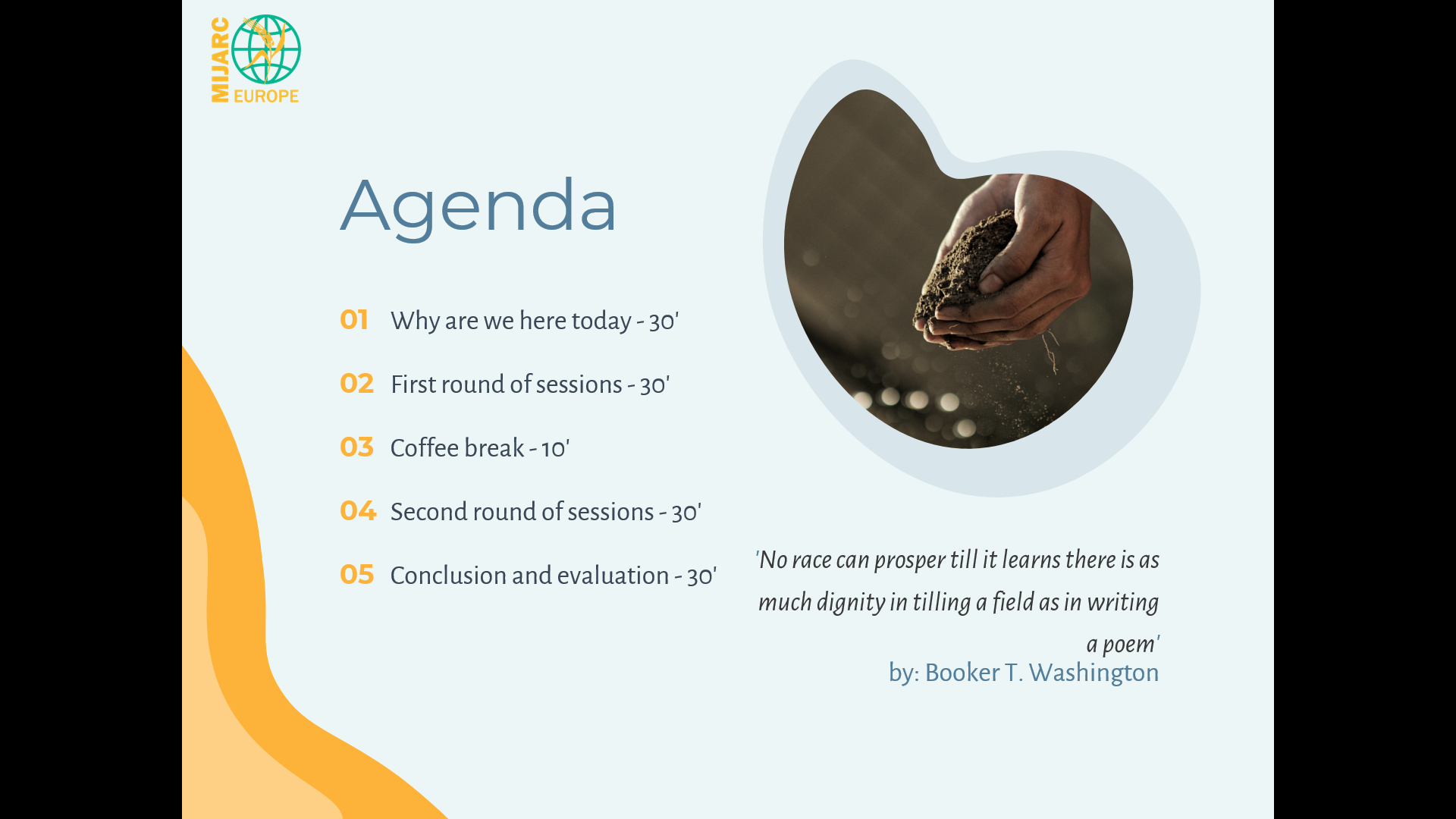
Ever since our summer activities were postponed and meeting our friends from abroad in person turned into an intention scheduled for ”whenever it will be possible again”, we started toying with the idea of doing something that would still bring us a piece of the excitement and satisfaction our traditional summer seminar did.
Our international webinar ”Youth participating by a hectare” managed to achieve all that and more. Scheduled on the 22nd July, when we had planned to be in France, visiting several local farms and agricultural initiatives, the webinar gathered young people and experts on agriculture who discussed the challenges young people face when it comes to getting involved in this field.
”No race can prosper till it learns there is as much dignity in tilling a field as in writing a poem”
Booker T. Washington
Although it was not initially included as an activity, the international webinar became part of our annual work plan “Rock, Paper, Participation“. The work plan focuses on seeing-judging-acting on how young people get involved in the dialogue on agricultural policies and on how they take part to sustainable agricultural practices.
The ”Rock, paper, participation” annual work plan is co-funded by the European Youth Foundation of the Council of Europe and the European Union.

The webinar gathered more than 60 participants out of the 91 who registered for it. They were all young people from one of the member organisations of MIJARC Europe, representing 8 European countries.
The 3,5 hour agenda was intense but time just flew by once the experts started talking about education and knowledge in the agricultural field, green jobs, agricultural policies and shared their personal stories of getting involved in the field.
Personal story always say something individual and different. They inspires us and give us motivation. If someone made it possible, we can also make it real.
pARTICIPANT TO THE WEBINAR
The webinar looked at agriculture from three perspectives: access to knowledge, information, and education, access to green jobs and engagement in agricultural policies. A study carried out by MIJARC World, FAO and IFA in 2011 revealed several challenges young people faced in the agricultural field and provided solutions for them. Almost ten years later, we wanted to analyse some of the challenges listed in the study, which are relevant for young people in Europe today, and look at them to see if they are still the same or what progress has been made so far.
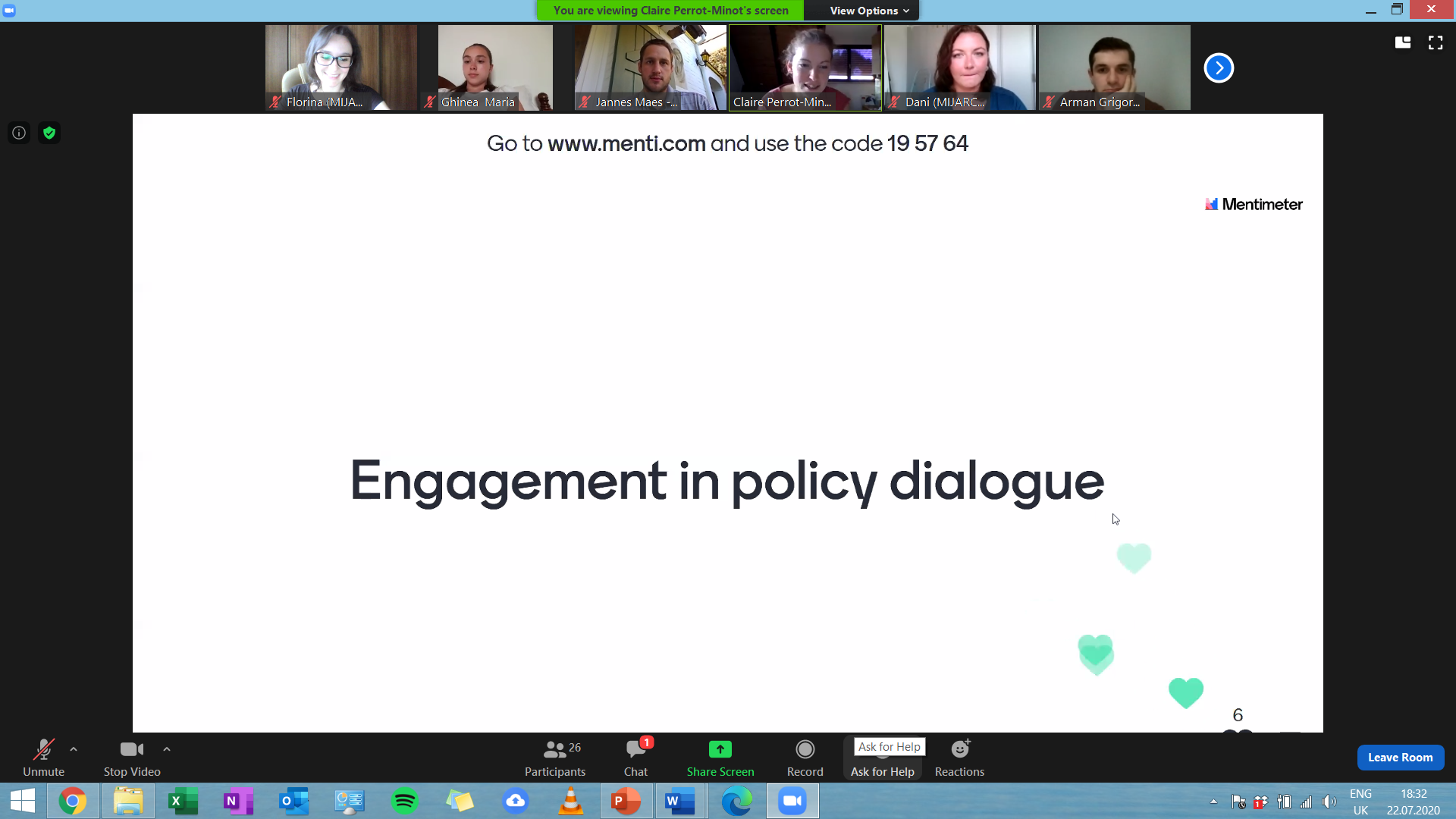
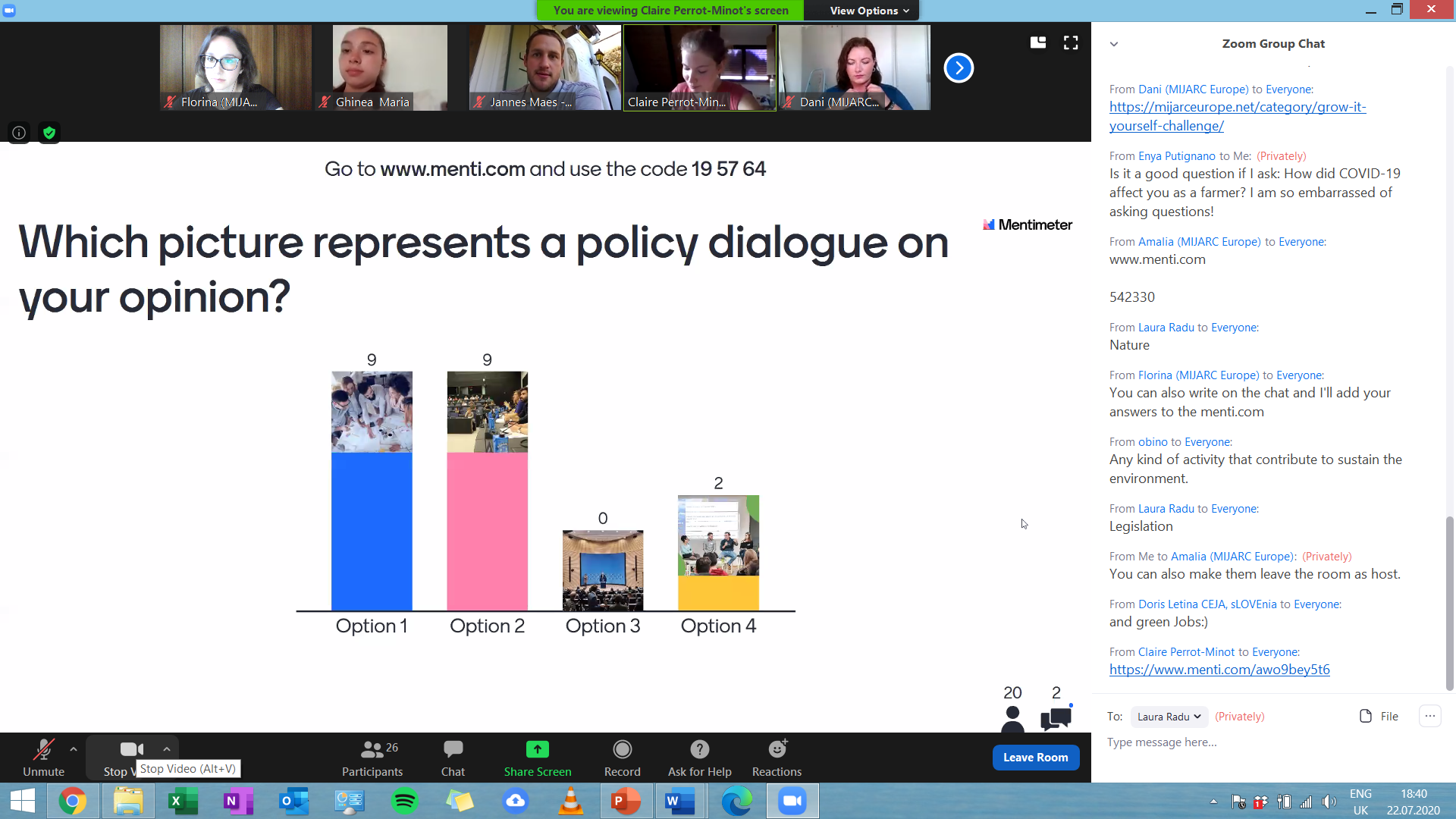
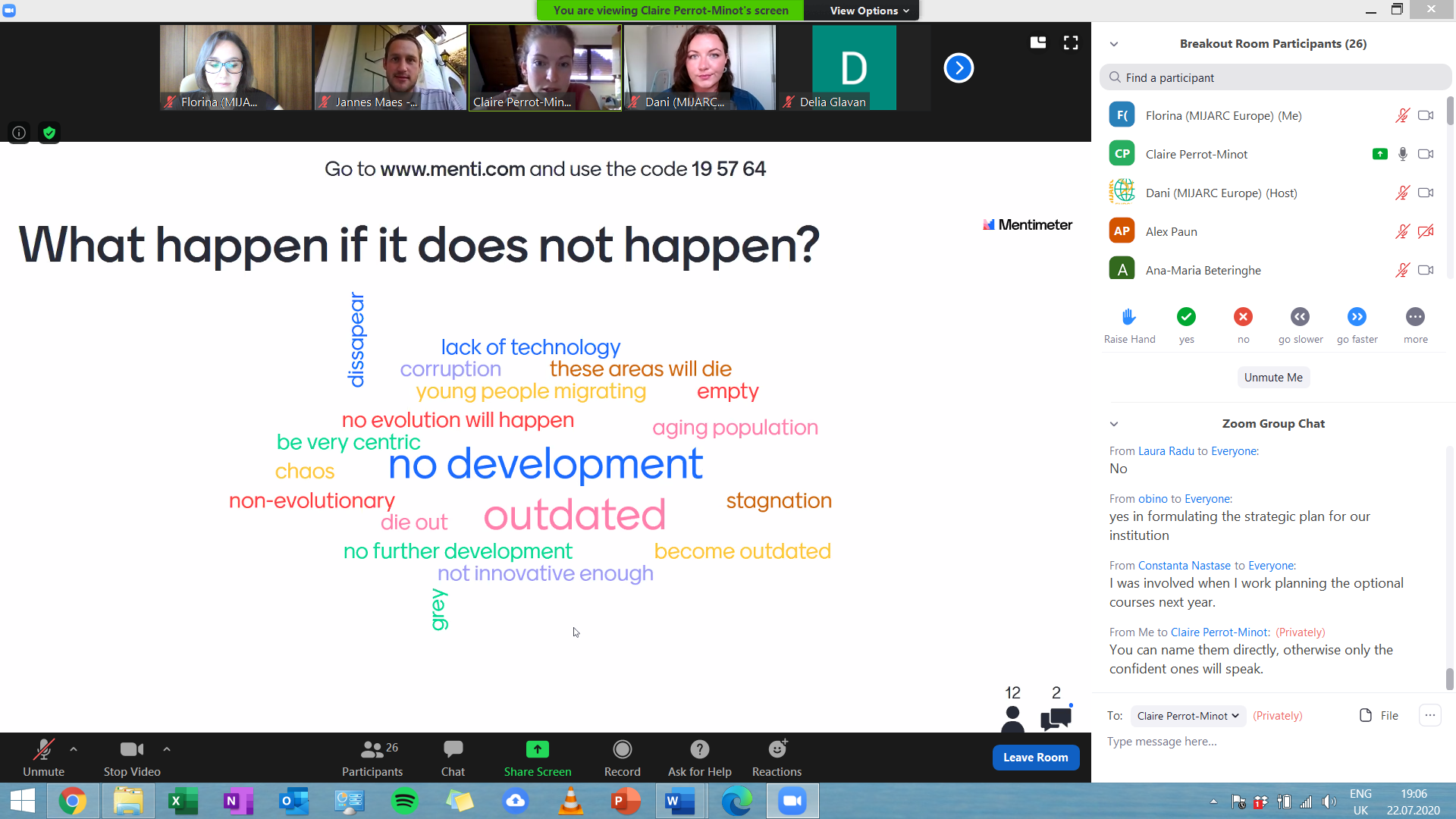
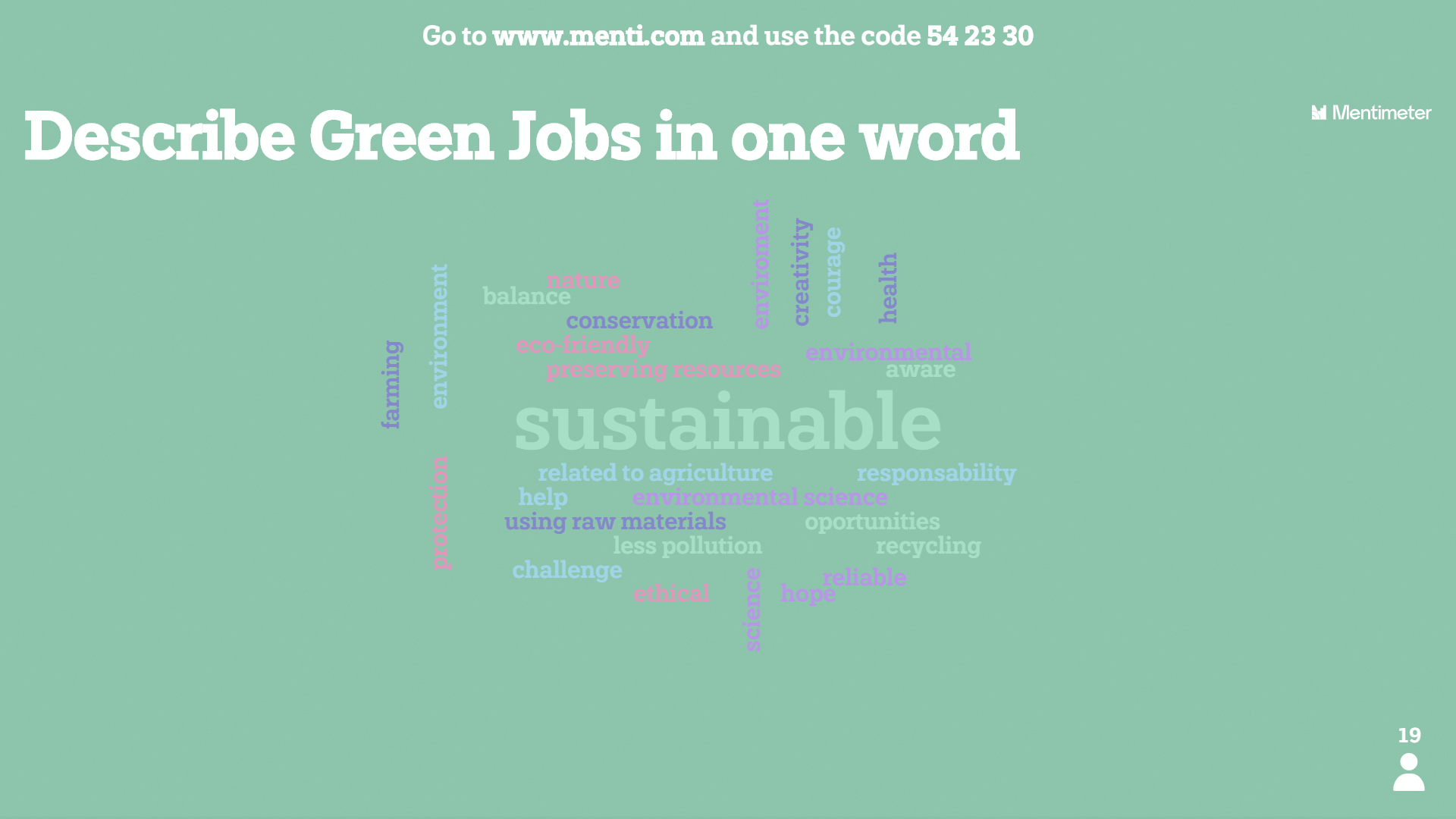
The webinar was split in four session: an introductory session, two rounds of discussion groups and a common session to draw the conclusions.
Session 1: Access to knowledge, information, and education & access to green jobs
The session began with asking the participants where they learnt about food and agriculture related issues and the poll revealed that most of then had learnt about these by means of their own research.
The first guest speaker was Russ Carrington, a former chairman of Rural Youth Europe, who is currently a farmer practicing regenerative agriculture in the United Kingdom. He joined the call directly from his farm and made a presentation about his life journey. He spoke about why he decided to go back to full-time farming like his parents, after having left to study Civil Engineering to follow a different career. During the Q&A Russ received many questions from the participants. The questions were about whether agriculture and farming is presented in schools as a viable option; about his opinion on the current and future situation of agriculture; about whether he could use his Civil Engineering knowledge in farming; and also about technical issues such as what is meant by sustainable agriculture and what is the role of GMO.
The second guest speaker was Doris Letina, the vice president from CEJA Young Farmers, who is a farmer cultivating apples in Slovenia. She firstly asked the participants to describe ”Green Jobs” in one word using the Mentimeter application.
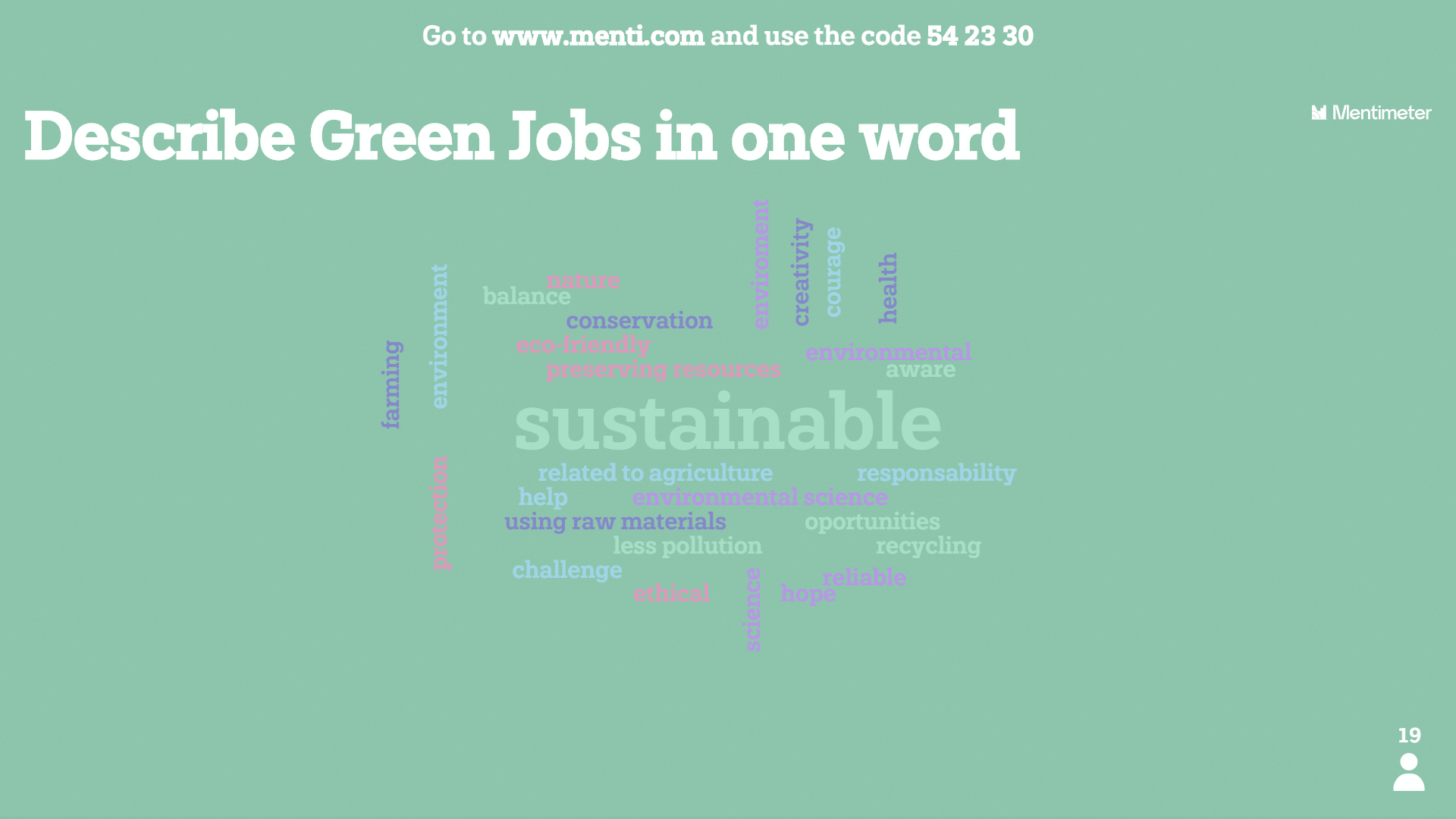
Some participants were then asked to elaborate on their chosen word, such as “conservation”, “responsibility” and “ethical”. Doris went on to giving a small presentation of what is understood as Green Jobs. Having received some inputs, the participants were then asked the questions: “What are we missing to have Green Jobs?”. This generated some interesting discussions and opinions such as the importance of public awareness, funding and change of societal values. Some participants came back to the importance of access to education, connecting to what was discussed in the first part of the session.
Session 2: Access and engagement of young people in policy dialogue
The session started by defining what is a policy dialogue by asking the participants to choose one picture out of four.
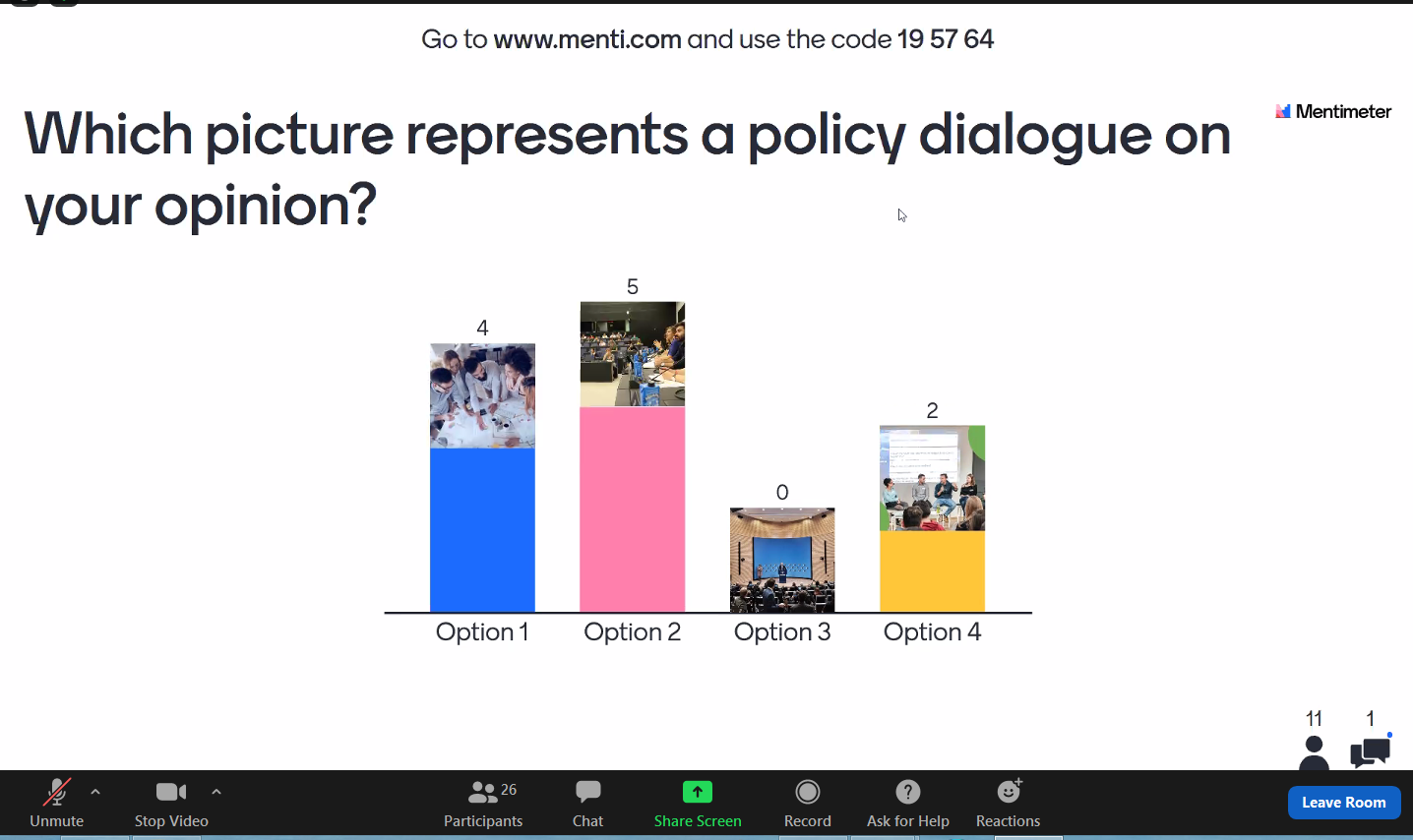
The choice of picture was partly different in the two sessions, but most of the participants chose pictures with young people working together at a table or discussion together. The session had two guest speakers: Jannes Maes, president of CEJA and Daniela Ordowski, board member of MIJARC Europe. Both of them underlined that engagement in policy dialogue is a process. The first step of it is to get organized with other people and define together what is the position shared by everyone and to agree on one message to communicate.
Further, the participants were asked if they had ever taken part in a policy dialogue and to share their experience about it, especially the issues and challenges they had. Some of the participants mentioned that they had never taken part in any dialogue on policies. They had the opinion that if young people do not search actively for such opportunities, they will not have the chance to take part in them. Others said that being in that session was already a step towards being active in policy dialogue. Jannes agreed that sometimes you have to ask for a place and this is not easy, but in general youth are then welcomed, because stakeholders and politicians know that they need the opinion of young people. For established organisations like CEJA or MIJARC Europe it is easier to be involved as an organisation than it is to join the dialogue as an individual. Youth organisations are crucial for the representation of young people.
Conclusions
During the final session, the participants reflected on the discussions they had in the discussion groups and a summary of the main points was made.
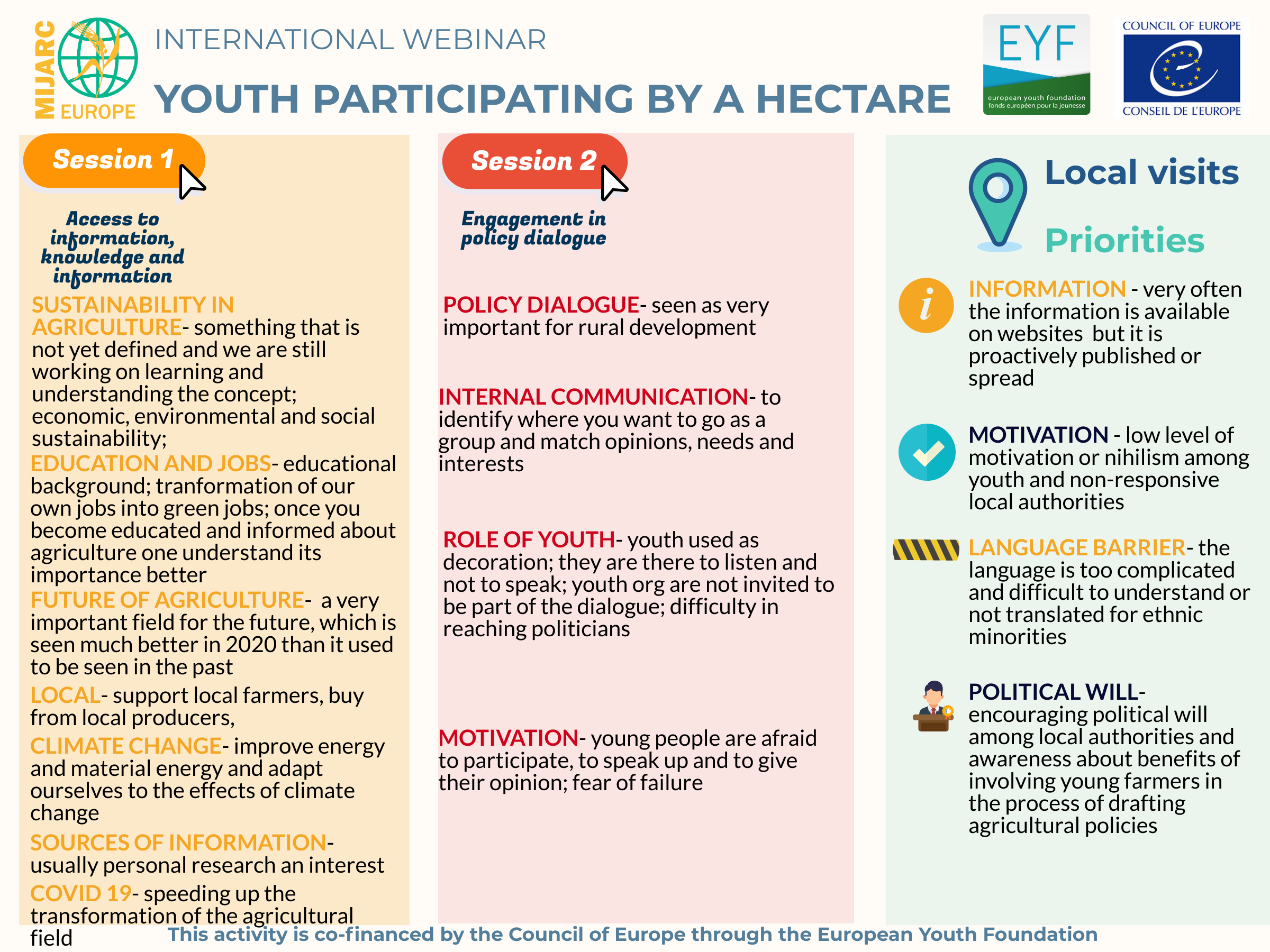
Finally a list of priorities identified during the webinar was made and the participants ranked them. The lack of education or its availability only in urban areas was the challenge most of young placed at the top, closely followed by the fact that youth in environmental protection is not a priority for governments these days and the fact the rural areas and farming are not given enough prominence in policies, media and on social networks.
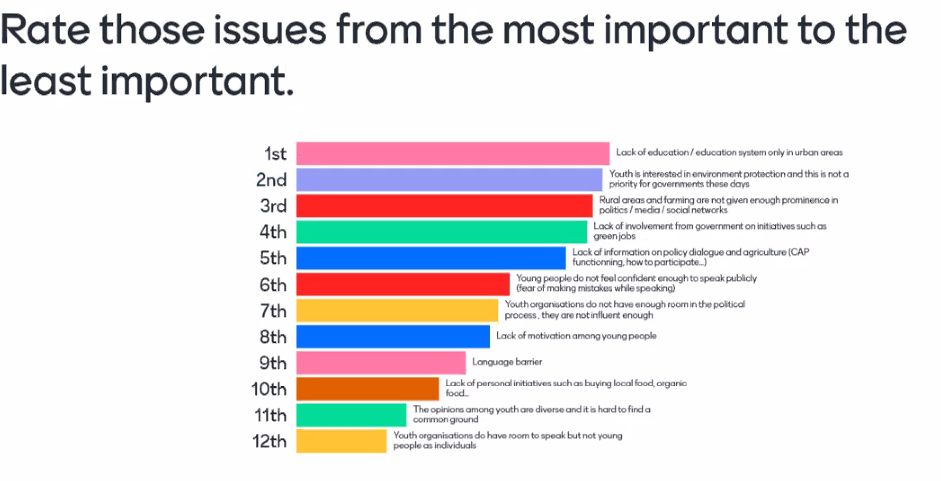
The priorities identified by the participants during the webinar will be collected together with those identified during the local visits in each country and will serve as the basis for the upcoming international activities. During the next phase of the work plan, the participants will develop concrete action plans to address the priorities. The action plans will be the main working tool for the third activity, when participants will create project proposals to help with the implementation of at least one measure included in the action plans.
The webinar was a very successful activity judging by the results of the evaluation form and the testimonials given by the participants.
”This webinar was very useful. Before this I didn’t even know that people like you are actually trying to solve problems like this one, the involvement of young people into agriculture and the development of rural spaces. The most useful thing that I have learnt is that with topics like this, there is still hope from the younger generations and I think that I have actually found some inspiration to speak out on what I want to say something, because until now I was too shy and I didn’t think that people really want to hear what someone like me would want to say.”
Participant
”On a personal level, I could relate my own education and life with the experiences that one of the speakers talked about. He inspired me to use most of the engineering and problem-solving capabilities to get involved in sustainable agriculture.”
Participant
Will I have enough time?
This is the question I asked myself when the team of the agriculture committee of MIJARC Europe proposed the idea of the Grow It Yourself challenge. I would have to buy seeds, potting soil, put it all in pots and make sure that my plants get enough light but not too much, that I water them enough but not too much… I know today that most of us were wondering about these questions.
What we didn’t anticipate was that the date we had set for the start of our campaign (April 1) would be in the middle of the lockdown period. Not knowing how long the quarantine lasted, the anxiety that came with the global pandemic, teleworking days that all looked the same, with no interruptions from taking transport or going for a walk… All this has shaken our relationship to time. Spatial and social inequalities were compounded by temporal inequalities, between those who suddenly had nothing to occupy their days and those who found themselves with even more work, doubled by childcare.
In this context, gardening has emerged almost as a symbol of our questioning of our relationship to time. It is an activity that requires patience as well as a form of slowness. And as I watched my plants germinate, make leaves and then finally the vegetables appear, I became more and more comfortable with the idea that this totally new period we were living through had its advantages in the midst of chaos. For once, I wasn’t coming home from work so exhausted that the only mechanical gesture I was capable of was checking my smartphone.
I read, I watched old movies, I cooked and… I grew life. I hope you’ll forgive me for the possible mawkishness of that statement, but all the same, the quarantine brought me back to basics, and for that I am grateful.
YouthLabs are participatory activities (online / offline format) to involve YOUNG Europeans in the design process of our pan-European campaign strategy.
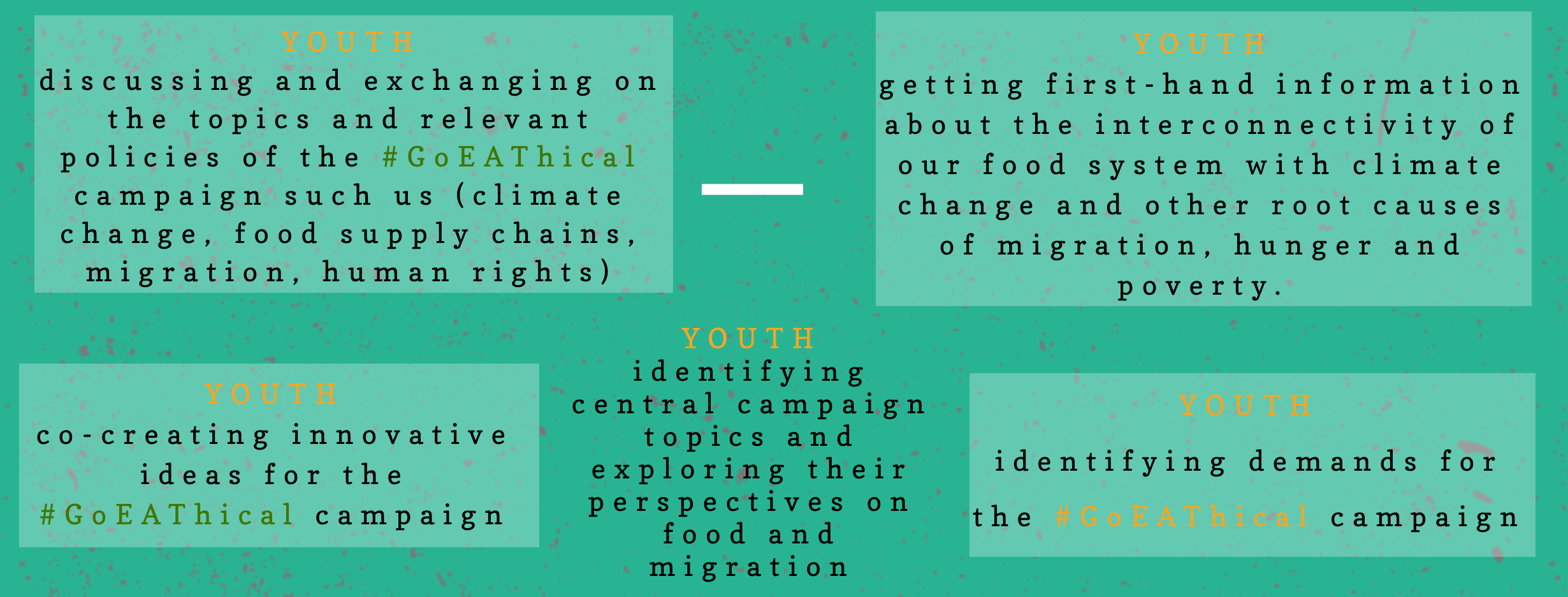
MIJARC Europe is responsible for organizing, within its network, 3 National Level YouthLabs and 5 International Level YouthLabs.
The first national youth lab of our #GoEAThical project was carried out in online format, in Romania together, with our member organization Asociația Asistență și Programe pentru Dezvoltare Durabilă – Agenda 21.
The activity took place in online format on the 5th of June 2020. It lasted around three hours.
42 young people, were selected among the network of global education schools of APSD-Agenda 21. They worked together with Mr. Daniel Alexandru – head of the Laboratory on Agrometeorology– from the Romania National Institute of Meteorology, and our colleague Florina Potîrniche as facilitator.
Using the SEE-JUDGE-ACT methodology, participants were able to go through different questions such as: What is climate change? // Is Earth’s Climate Changing? // What Is Causing Earth’s Climate to Change? // What Might Happen to Earth’s Climate? // How does it affect the production of food? // Conventional agriculture vs. Organic agriculture?
Later on, after summarizing the discussion and highlighting the interconnection of food production and climate change and the main impacts climate change has on different parts of the world, the participants analysed a case study, which was based on real facts –The impact of the El Niño drought in 2016 on one family in Lesotho–
Through this case, participants were able to see how climate change affects the normal weather and climate patterns. The result was a severe drought that lasted since 2015 until 2016. This led to food supplies constantly decreasing, the price of food increasing and ultimately the poorest population not able to ensure they daily food. This led to poverty, hunger, the urgent need for humanitarian support and massive migration.
All the young participants could reflect on the negative impacts of climate change, and in different groups, they went into the ACT part. Divided in breakout rooms of 4-5 people they went through an exercise to design some elements for the #GoEAThical campaign. The youth participants participants discussed and created different proposals of messages for the campaign, topics for the campaign, as well as different activities to be carried out.
They produced really interesting ideas!
Here you can read some of the comments from the young participants gathered during the evaluation:
“I really liked that I interacted and came up with many different ideas. I learned new things about climate change and what we can do to make it better”
“I liked this lab because I learned a lot of new things. The most useful thing I found out is the connection between climate change and migration”
“Participating in this laboratory helped me to become more aware of why it is important for each of us to have a responsible attitude towards the environment and what are the consequences of reckless long-term actions on the climate and especially food production. Change begins with each of us!”
Change for the better and feel good about it”
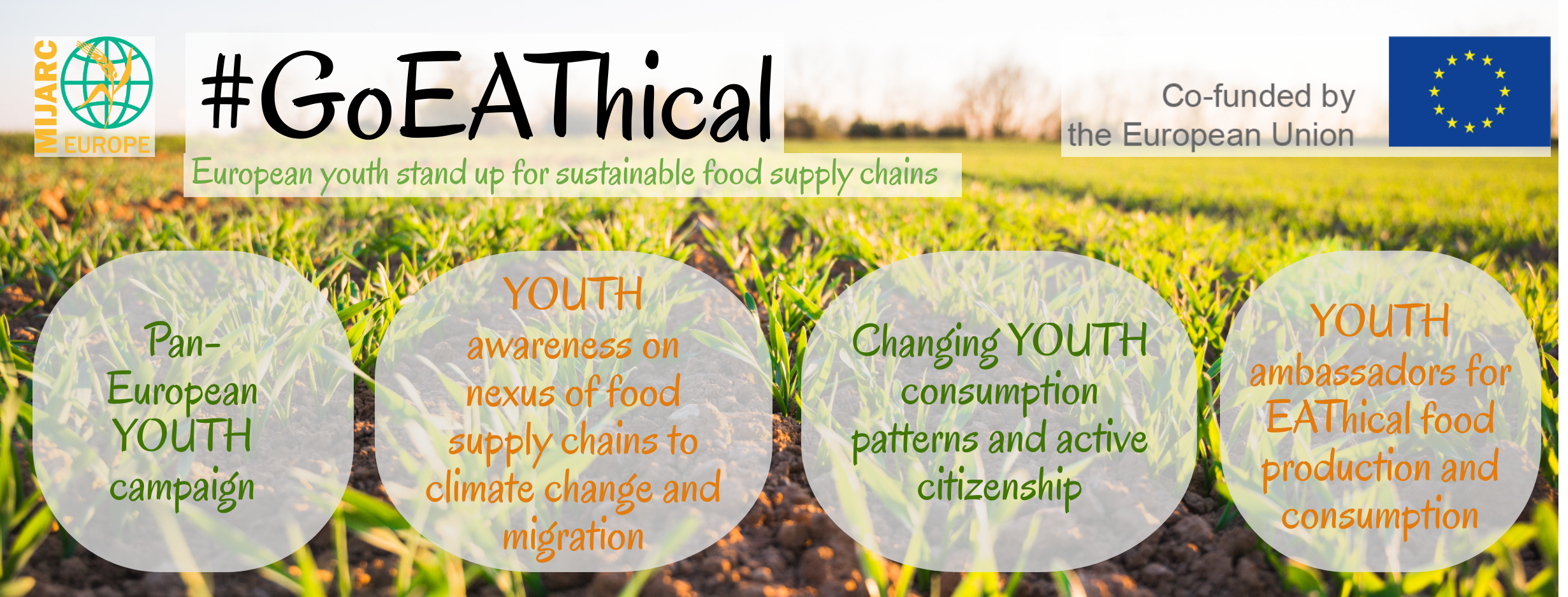
The story of how I planted my own food for a social media challenge and started my dream of self-sufficiency
I have dreamt of planting my own food since I was a child, but the city lifestyle kept me from starting any concrete action. I was always wondering how to plant anything inside an appartment, if I would be able to take care of home plants and how it would work if I had to leave the place for a certain amount of time.
Then the Covid-19 crisis happened as long as the lockdown that went with it, and as for everyone, my plans have changed. So as I was certain to be home and to have time, I decided to join the “Grow It Yourself challenge” organized by MIJARC Europe and to plant green bean seeds at home and take care of the plant during the pandemic. I must say that when I saw how people were running from one market to another, buying everything in sight, the idea of self-sufficiency seemed all of a sudden particularly appealing to me. My green beans were a good place to start.
Taking care of beans
The very first thing to do was to make sure there would be enough humidity for the seeds to germ. I found the whole process described in a video onYouTube. When seeds were ready to be cultivated, I did a little digging and tilling. A couple of weeks later the leaves appeared. Some more care was needed. I asked my grandparents who live in the countryside for help and experience sharing. I got to say that observing the whole process of a plant growing everyday is quite amazing.
Enjoying the beans
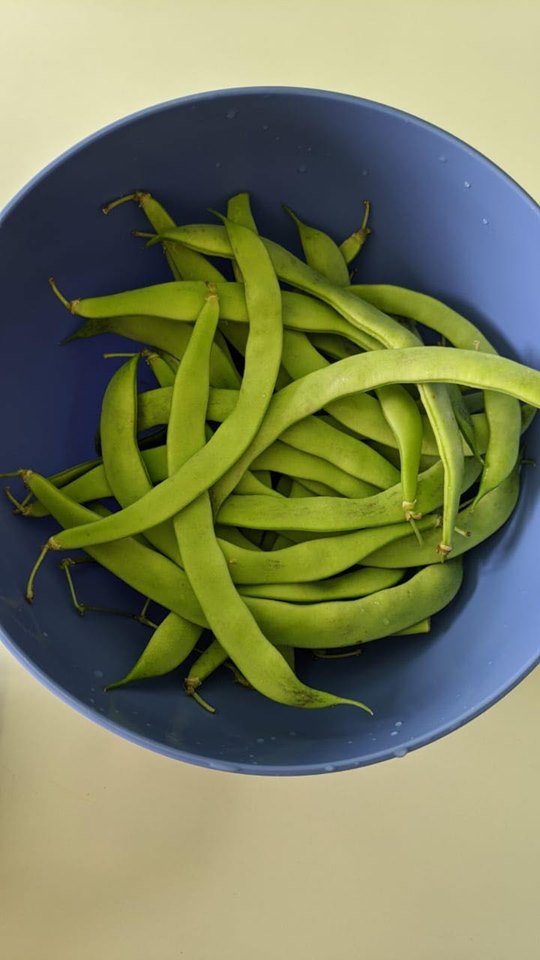
A couple of days ago the harvest was ready. Of course, it was not much (you can see from the pictures how small my plant was). However, I got to prepare a meal with my own planted green beans and this felt special.
I took the easiest way: boiling green beans in hot water, then adding garlic and salad greens to the main dish. The beans have been cleaned and washed, then the boiling process took about 30 minutes. Then I used garlic and salad greens to bring delicious taste.
Here is the main dish ready to be eaten. I personnaly think it looks delicious (and it was). Of course, I cannot cook this meal for a dinner with guests as I do not have enough beans, but it is good for one person.
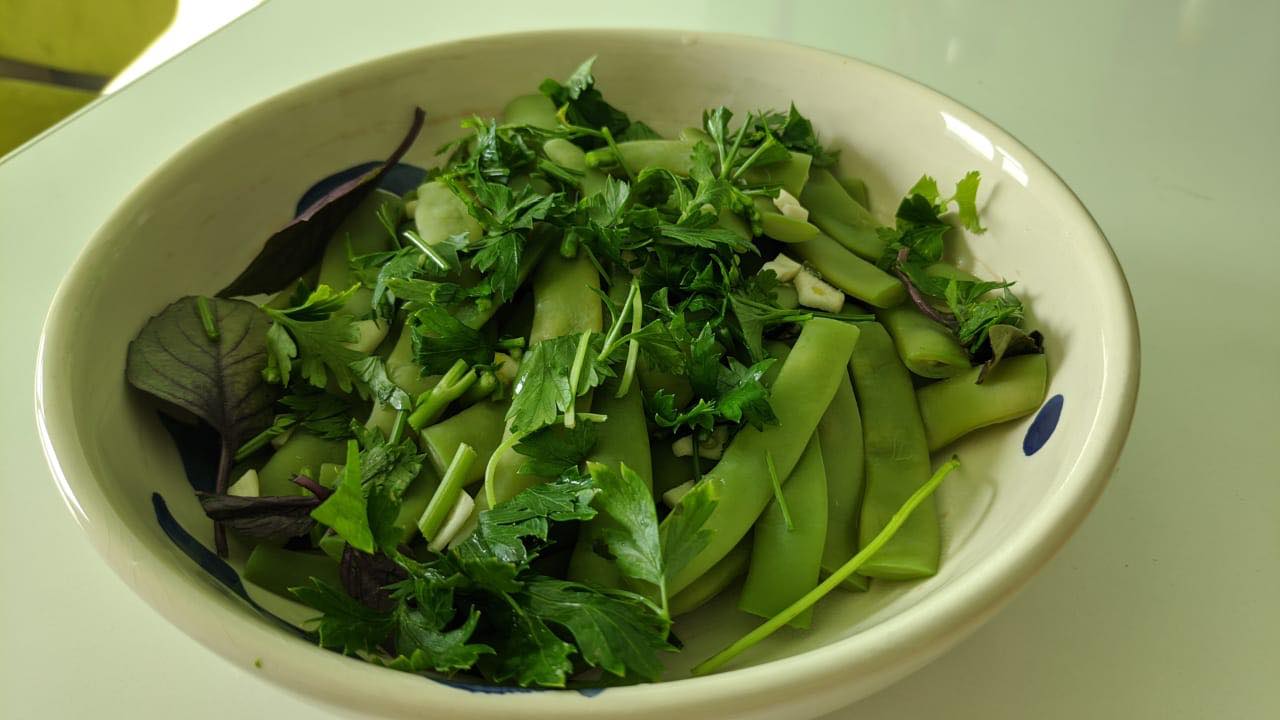
Through this food planting process, I have learnt a lot. Now I am motivated to cultivate more green beans in the next spring, which will help me to share my food with others.
I hope that my own experience will motivate others to plant their food. That’s an amazing feeling when you eat the food cultivated by yourself. I encourage young people to plant their own food and get ready to those amazing feelings.
Bon appétit !
Harutyun Tsatryan
In the last years, all the participants at MIJARC Europe’s activities paid additional fees on top of the regular participants’ fees. We now want to reinvest these carbon offset fees in a project that is a model for the prevention of greenhouse gases.
To implement this we want to open a contest for our local and regional groups to win an award of €240 (two hundred and forty Euros). Considering its view on sustainable development, MIJARC Europe promotes a reduction of greenhouse gas emissions. The aim is to foster young people addressing the danger of greenhouse gas emissions. At the same time we want to support the work of MIJARC European youth groups.
Eligibility Criteria
The group that applies for it must be a youth led group, be it a local or a regional group
from a MIJARC Europe members movement;
The project to be awarded needs to be mainly finished within the calendar year of 2020;
The prize money must not exceed 50% of the total project costs;
In order for us to evaluate the project, a transparent presentation on the use of the money needs to be handed in to the MIJARC office by November 2020;
Award Criteria
We want to evaluate the different projects in a transparent process. We will therefore assess the:
Number of people involved;
Approximate amount of CO2 that is reduced;
Sustainability of the project (if it is a long-term project, what materials and which resources are/were used);
Possibility to raise sponsorship by other donors;
Visibility of the project in local/regional media;
Quality of presentation.
We therefore call on you to either present your projects on greenhouse gas reduction or start a project on this topic and establish a presentation on it.
How to apply
You should send us by e-mail: office-europe@mijarc.info in a pdf or word document, with maximum 5 pages A4, your group’s presentation explaining as detailed as possible how your initiative fulfils the eligibility and award criteria explained above.
Please, when sending your e-mail write in the subject line “Carbon Offset Price Application”. An email confirming the reception of your application will be sent to you as soon as possible. If you don’t receive it within one week after you sent your application, please contact us.
The deadline for receiving applications is the 15th August 2020 at 12:00 pm (Brussels time).
TIMELINE
June 2020 – Call for proposals
15th August 2020 – Deadline for applications
September 2020 – Communication of the award decision
If you are selected for the award, you will receive 50% of the amount immediately. The other 50% will be sent when MIJARC Europe will receive a final report. The report needs to include a transparent cost calculation and in order to make sure the sustainability of the project how you intend to do the follow-up of the project.
In case you still have questions or need any further information, please contact us: office-europe@mijarc.info
Full guidelines:
